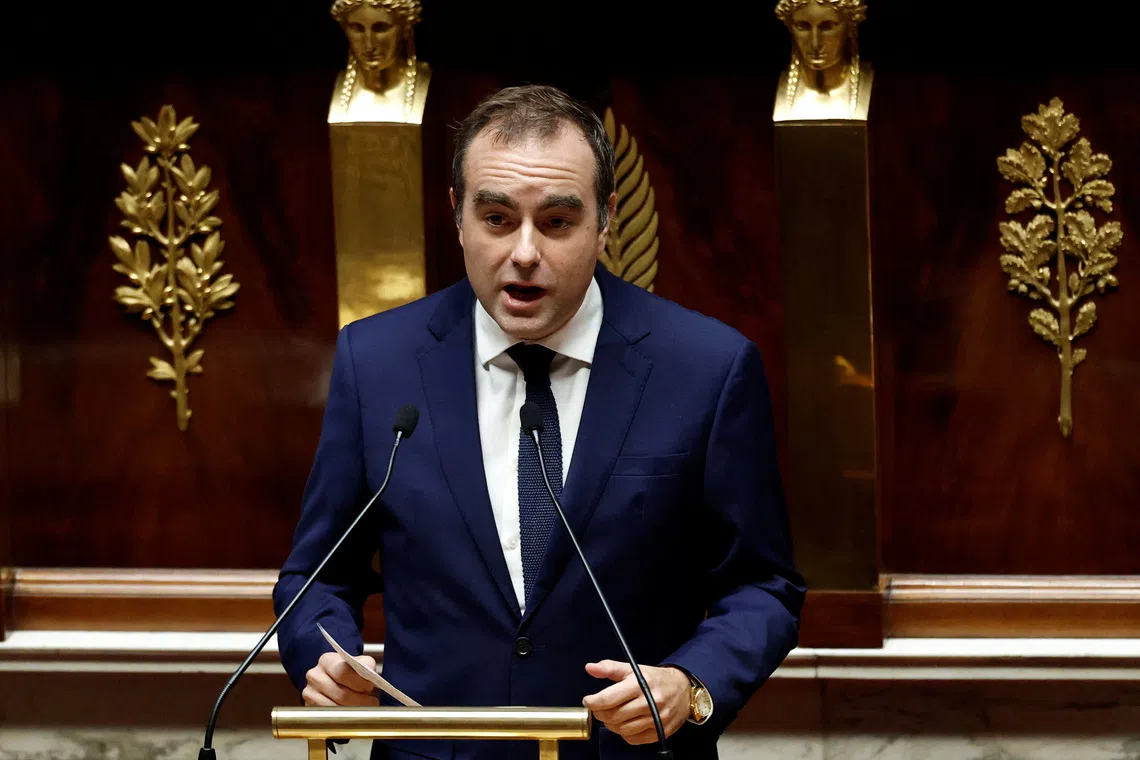French PM survives no-confidence votes after making pension concession
Sign up now: Get ST's newsletters delivered to your inbox

French Prime Minister Sebastien Lecornu delivers a speech during a public session at the National Assembly in Paris, France, on Oct 16.
PHOTO: REUTERS
PARIS – French Prime Minister Sebastien Lecornu survived two no-confidence votes in Parliament on Oct 16, winning crucial backing from the Socialist Party, thanks to his pledge to suspend President Emmanuel Macron’s contested pension reform.
The two motions presented by the hard-left France Unbowed and the far-right National Rally (RN) secured just 271 and 144 votes respectively – well short of the 289 votes needed to bring down Mr Lecornu’s days-old government.
Mr Lecornu’s offer to mothball the pension reform
Despite the reprieve, the motions underscored the fragility of Mr Macron’s administration midway through his final term.
“A majority cobbled together through horse-trading managed today to save their positions, at the expense of the national interest,” RN party president Jordan Bardella wrote on X.
The French bond market remained steady after the back-to-back votes, with the government victory widely expected by investors.
Lecornu faces arduous budget negotiations
By putting the pension reform on the chopping block, Mr Lecornu threatens to kill off one of Mr Macron’s main economic legacies at a time when France’s public finances are in a perilous state, leaving the President with little in the way of domestic achievements after eight years in office.
There are 265 lawmakers in Parliament from parties that said they would vote to topple Mr Lecornu, and only a handful of rebels from other groups joined their cause.
If Mr Lecornu had lost either vote, he and his ministers would have had to resign immediately, and Mr Macron would have come under huge pressure to call a snap parliamentary election, plunging France deeper into crisis.
But despite the outcome of the votes on Oct 16, Mr Lecornu still faces weeks of arduous negotiations in Parliament over passing a slimmed-down 2026 budget during which he could be toppled at any point.
“The French need to know that we are doing all this work... to give them a budget, because it is fundamental for the future of our country,” said Ms Yael Braun-Pivet, the president of the National Assembly and an ally of Mr Macron.
“I am pleased to see that today there is a majority in the National Assembly that is operating in this spirit: work, the search for compromise, the best possible effort,” she added.
After winning the pension concession, the Socialists on Oct 15 set their sights on including a tax on billionaires in the 2026 budget, underlining just how weak Mr Lecornu’s hand is in the negotiations.
Political kryptonite
France is in the midst of its worst political crisis in decades as a succession of minority governments seek to push deficit-reducing budgets through a truculent legislature split into three distinct ideological blocs.
Reforming France’s generous pension system has been political kryptonite ever since Socialist President Francois Mitterrand cut the retirement age to 60 from 65 in 1982. In France, the average effective retirement age is just 60.7, compared with the Organisation for Economic Cooperation and Development average of 64.4.
Mr Macron’s reform raised the statutory retirement age by two years to 64 by 2030. Although that only brings French policy into line with other European Union member states, it chips away at a cherished social benefit beloved by the left. REUTERS


